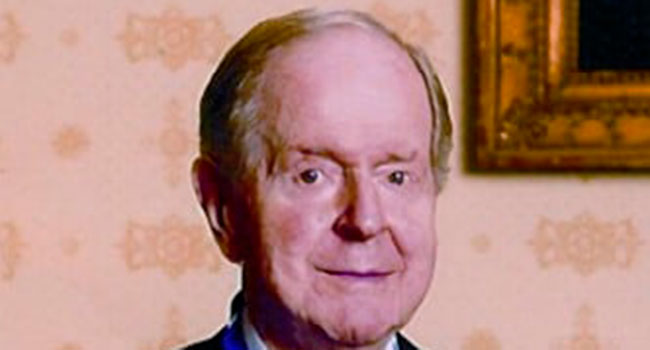 Robert Conquest, who died on August 3 at the age of 98, was an interesting guy. He was also a man ahead of his time, someone who was prepared to row against the current when necessary. With books like The Great Terror (1968) and Harvest of Sorrow (1986), he told the truth about Stalinism, and espoused an anti-communism that wasn’t particularly fashionable in Western academic circles.
Robert Conquest, who died on August 3 at the age of 98, was an interesting guy. He was also a man ahead of his time, someone who was prepared to row against the current when necessary. With books like The Great Terror (1968) and Harvest of Sorrow (1986), he told the truth about Stalinism, and espoused an anti-communism that wasn’t particularly fashionable in Western academic circles.
Born in 1917 England to an American father and an English mother, Conquest didn’t always think that way. Indeed, after joining the Communist party as a young man at Oxford, he even went so far as to visit the Soviet Union in 1937. But the outbreak of the Second World War began to change his perspective.
Although often glossed over nowadays, Adolf Hitler’s Germany and Josef Stalin’s Soviet Union were allies in 1939. And for the British and American Communist parties, whose primary allegiance was always to Moscow, this translated into opposing participation in the war. It was only after Hitler turned on Stalin in June 1941 that they suddenly became fiercely engaged in the anti-Nazi fight.
Conquest, however, had no such conflicted loyalties. Volunteering for military service, he joined the Oxford and Buckinghamshire Light Infantry and was subsequently transferred to the Intelligence Corps, which dispatched him to Bulgaria as a liaison officer in 1944.
And if the dynamics of 1939 initiated Conquest’s disillusionment, the process was completed by Bulgaria where he continued in a Foreign Office capacity after the war. Witnessing the Stalinist takeover, he was now a resolute anti-communist.
The Great Terror wasn’t Conquest’s first book, but it was the one that established his reputation. When it landed in 1968, the academic New Left was stretching its legs. And while the romanticism that surrounded the Soviet Union in the 1930s had significantly dissipated, there were lots of fresh revolutionary icons – such as Mao, Fidel Castro and Che Guevara – to take up the slack. Political pilgrims had new places of worship, but the faith was still the same.
| MORE IN BOOKS |
| 19th century Scottish novelists cast a long shadow By Pat Murphy |
| Canada’s Fenian years featured some interesting personalities By Pat Murphy |
| Divvying up the Middle East after First World War By Pat Murphy |
In such an environment, The Great Terror’s detailed account of Stalin’s purges, executions and exterminations created a stir. To quote the historian Timothy Garton Ash, Conquest “was Solzhenitsyn before Solzhenitsyn.” He was also controversial. After all, if you poke at people’s dearly held ideological certainties, they won’t necessarily thank you for it. Stalin may no longer have been the movement’s hero, but a relentlessly detailed dissection was getting uncomfortably close to home.
Mind you, Conquest was fully capable of fighting in his own corner. You could even say that he relished the role of polemicist as much as that of historian. To him, the delusions of apologists for the Soviet Union in general, and Stalin in particular, were a form of “mental aberration.”
And it wasn’t merely a matter of these apologists having been deceived. Self-deception was also at work. As Conquest pungently expressed it, “a con job needs a con man and a sucker.” Put another way, the mind will often believe what the heart wants it to, and neither intelligence nor education offers any particular protection.
Regarding himself as a man of the moderate left, Conquest continued for many years as a Labour supporter. As long as the party included robust anti-communists like Ernest Bevin and Barbara Castle, he was comfortable within it.
However, alarmed at developments in the 1970s, he switched allegiance to Margaret Thatcher, becoming one of her key foreign policy advisers in the process. Writing to him privately about a major foreign policy speech, she described an advance manuscript of his Present Danger as providing “the meat of the text in the places where it really mattered.”
Robert Conquest’s long life wasn’t entirely devoted to writing about history and international politics. He was also a novelist and a poet. And with regard to the latter, it wasn’t all serious stuff, as evidenced by his propensity for limericks – sometimes even bawdy ones. As noted earlier, he really was an interesting guy.
But the most important thing about him was caught by none other than Michael Ignatieff. Reviewing Conquest’s Reflections on a Ravaged Century, Ignatieff observed that “One of the few unalloyed pleasures of old age is living long enough to see yourself vindicated. Robert Conquest is currently enjoying this pleasure.” All in all, not a bad epitaph.
Troy Media columnist Pat Murphy casts a history buff’s eye at the goings-on in our world. Never cynical – well perhaps a little bit.
For interview requests, click here.
The opinions expressed by our columnists and contributors are theirs alone and do not inherently or expressly reflect the views of our publication.
© Troy Media
Troy Media is an editorial content provider to media outlets and its own hosted community news outlets across Canada.


